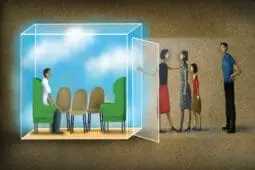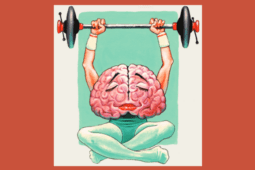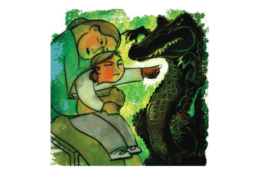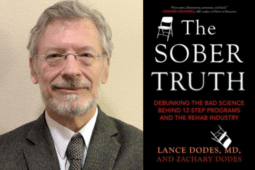Latest
VIDEO: The Hidden Toll of DSM-5 on Psychotherapy
How Increasing Medication Sales Hurt the Therapy ProfessionAllen Frances—author of "Saving Normal: Has Psychiatric Diagnosis Gotten Out of Control?"—is one of DSM-5’s most outspoken critics, but his ultimate... Read more
VIDEO: The Neurobiology of Anxiety
How to Incorporate Brain Science into Your Treatment ApproachAccording to Margaret Wehrenberg, when it comes to clients with panic disorders, the first thing to discern is what they’re doing to avoid panic. “The... Read more
VIDEO: What Distinguishes the Male and Female Brain?
How the Evolutionary Story Lives within Each of UsWhy do young boys tend to roughhouse while young girls lean towards relational play? According to Louann Brizendine, these and many other differences observed... Read more
VIDEO: The Increasing Role of Biology in the DSMs of Tomorrow
How Genetics Shape PsychopathologyRather than continuing to lament the deficiencies of DSM-5, forensic psychiatrist David Mays wants to focus on what's ahead for the psychotherapy field. In his... Read more
VIDEO: The Key to Dramatically Accelerating Anxiety Treatment
Being Anxious Doesn’t Mean You’re Anxious to ChangeMost therapists assume that, just as any rational person with a broken arm would be an eager customer for medical care, surely a person suffering from severe... Read more
VIDEO: How to Install New Mental States
What Therapists Should Know about Brain ChangeUntil recently, the impact of brain science on the everyday work of most therapists has been pretty limited. According to Rick Hanson, that’s because we’ve... Read more
Becoming a Supershrink: Three Steps to Professional Excellence
Getting Client Feedback Isn’t Always Easy, But It's a Necessary StepMost therapists, when asked, report checking in routinely for client feedback and knowing when to do so. But research has found this to be far from true. Read more
What the PTSD Diagnosis Leaves Out
Broadening Our Understanding of TraumaBack in the late 1970s, a motley crew of Vietnam War vets, sympathetic psychiatrists, antiwar activists, and church groups undertook a crusade to have a... Read more
VIDEO: How to Make Clients Feel Safe
Today's Video: Bringing Polyvagal Theory into Your PracticeHow can therapists acquire neuroscientific knowledge without becoming brain scientists themselves? Even more pressing, what real-life practical therapeutic... Read more
Why DSM-5 Is a Step Forward for Psychotherapy
Find Out About the Benefits of Dimensional DiagnosisIn this video clip, Regier talks about how the new definition of a major depressive disorder in DSM-5 better enables clinicians to diagnose clients who exhibit... Read more
Editor's Note - May/June 2014
Trauma, the alluring diagnosis of the therapy profession.No other single condition tests the therapeutic relationship quite so stringently, demands so much from the clinician, or combines so many disparate treatment... Read more
Outside the Box
Bringing Families into Trauma TreatmentIf we don’t open up the one-on-one therapeutic cloister, trauma sufferers may never learn how to engage in the give and take of real-life relationships. By... Read more
When Victims Victimize Others
Some Clients Challenge our Capacity for CompassionMost therapists find it relatively easy to feel empathy for the usual hyperaroused, vulnerable trauma client. But it can be a lot tougher to remain... Read more
Putting the Pieces Together
25 Years of Learning Trauma TreatmentTwenty-five years ago, we believed that helping trauma survivors dig into dark and unspeakable horrors would set them free. But in this new age of trauma... Read more
Engaging the Emotional Brain
Highlights from Symposium 2014To get through to clients in our increasingly ADD culture, therapists must learn to evoke a deeper, more visceral engagement with them. At this year’s... Read more
Do Brain Games Build Cognitive Muscle?
Grim Job Prospects for Mental Health GradBrain games and grad prospects Read more
The Case for Neurofeedback
Rewiring the brain in the consulting roomThe increasing popularity of neurofeedback is based on the growing evidence that a wide variety of psychological disorders can be understood as firing mistakes... Read more
Rush to Judgment
Beware of the ADHD diagnosisPart of the epidemic of misdiagnosed ADHD in young children today results from a failure to understand how trauma often leads to difficulty learning in school. Read more
Brain Imaging and Psychotherapy
Why is it so controversial?For nearly 20 years, psychiatrist Daniel Amen has led a controversial crusade to make brain imaging an accepted part of psychotherapeutic practice. Read more
12 Missteps?
The evidence that AA works is many steps behindThe authors of a provocative new book argue that, despite its sterling reputation, alcoholics anonymous has one of the worst success rates in all of medicine. Read more
Me and My Belly
A Lifelong RelationshipA middle-aged man explores his troubled relationship with the body his genetics have saddled him with. Read more
The Brain Science of Self-Deception
Understanding the Limits of Self-AwarenessIt’s commonly suggested that depression results from seeing reality too clearly. Repression, denial, and humor grease the social wheels and lead us to put a... Read more
VIDEO: Creating Antidote Experiences in Therapy
How to Turn Positive Mental States into Enduring TraitsIn this video clip, Rick talks about how to activate positive mental states and help clients embody them so that they become permanent resources. Read more
Understanding the Dangers of Diagnostic Epidemics
The Most Powerful Psychiatrist in America on Why DSM-5 Is a Step BackwardAllen Frances learned first-hand how, even when motivated by the best of intentions, changes in the “bible of psychiatry” can have large-scale negative... Read more
VIDEO: How Meeting Condition Criteria Doesn't Equal Mental Disorder
Jack Klott on One of the Diagnostic Changes in DSM-5While the publication of DSM-5 came with many surprises, few were as shocking—or as controversial—as the number of changes made to diagnosis specifiers... Read more
VIDEO: DSM-5 and the Elimination of Disorders
Martha Teater on the Removal of Asperger's from DSM-5Asperger’s no longer exists—at least not in the DSM-5. And there are other changes, like the omission of sexual addiction, that many therapists are... Read more
VIDEO: Like It or Not, DSM-5 Will Affect Your Practice
Martha Teater on One of the Major Changes in DSM-5Whether you’re a critic or a proponent of DSM-5, that fact that it exists and will affect your practice is undeniable. Between several new diagnoses, the... Read more
The Best DSM Ever Written?
Jack Klott, an Advocate for DSM-5, Speaks OutJack Klott discusses the DSM5 and why it's a triumph in the field, despite its flaws. Read more
Managing Transference and Countertransference in Somatic Therapy
Does Body-Oriented Therapy Increase the Risk of Transference and Countertransference Responses?Therapeutic skeptics still cite the possibility of stirring up intense transference and countertransference responses as a compelling reason not to use more... Read more
VIDEO: Is Psychotherapy Becoming Overly Diagnostic?
Allen Frances on Why DSM-5's New Diagnoses Aren't NecessaryOne of the most note-worthy changes in the DSM-5 is the abundance of new diagnoses that are included in this new edition. Many DSM-5 critics worry that this is... Read more


























